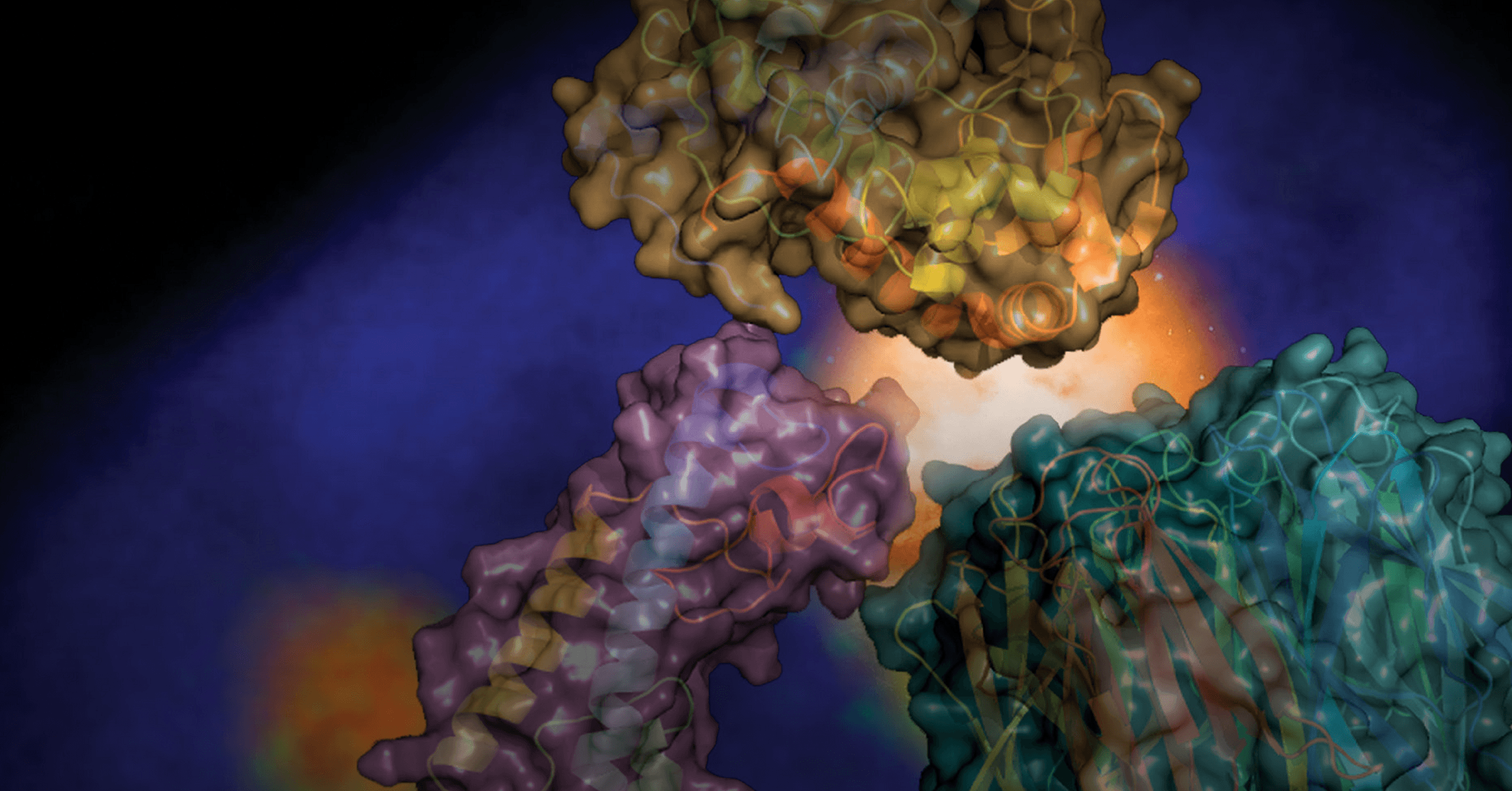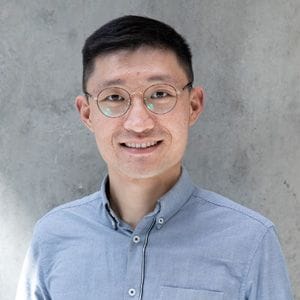The Gordon Hammes Awards collectively celebrate significant achievements in biological chemistry, recognizing both established scientists whose work has profoundly impacted the field and young scholars for their outstanding published research. Read the interviews with the 2025 winners.

Biochemistry and the ACS Division of Biochemistry and Chemical Biology are pleased to announce the winner of the 2025 Gordon Hammes Lectureship Award, Prof. Karen Allen (Boston University, United States), and the winner of the 2025 Gordon Hammes Scholar Award, Dr. Jianjun Cao (Monash University, Australia).
The awards will be presented at ACS Fall 2025 in Meeting Room 5 of the Westin DC Downtown on Tuesday, August 19 from 9:00 AM-12:00 PM. The winners will each be presenting a lecture along with David Christianson and Charles Sanders – a structural biology masterclass not to be missed! View the full agenda here.
Prof. Karen Allen, 2025 Gordon Hammes Lecturer

Karen N. Allen is a Professor of Chemistry at Boston University. She is also a Professor of Material Science and Engineering and is a member of the faculty of the Bioinformatics and Molecular and Cell Biology & Biochemistry programs at Boston University and Pharmacology, Physiology & Biophysics at the School of Medicine. Prof. Allen earned her B.S. degree in Biology, cum laude from Tufts University and her Ph.D. in Biochemistry from Brandeis University, in the laboratory of mechanistic enzymologist, Dr. Robert H. Abeles, focused on the design, synthesis, and inhibition kinetics of transition-state analogues of acetylcholinesterase and liver esterases. Following her desire to see enzymes in action she pursued X-ray crystallography during postdoctoral studies as an American Cancer Society Fellow in the laboratory of Drs. Gregory A. Petsko and Dagmar Ringe. Since 1993 she has led her own research team at Boston University, first in the Department of Physiology and Biophysics at the School of Medicine, and since 2008 in the Department of Chemistry.
Prof. Allen's research has focused on the elucidation of enzyme mechanisms and the understanding of how Nature has evolved new chemistries from existing protein scaffolds. Within this context, her laboratory has plumbed the basis of enzyme-mediated phosphoryl transfer, phosphoglycosyl transfer and decarboxylation reactions. In addition, Prof. Allen has sought to provide new tools for the exploration of protein structure and function by the invention and implementation of lanthanide binding tags.
Prof. Allen has been a named lecturer and seminar speaker on over 120 occasions and has chaired national and international meetings. Her work is published in > 130 peer-reviewed articles. She has served on Council and as Secretary of the ASBMB and as Program chair and counselor for the Biological Chemistry and Chemical Biology Division of the ACS. In 2022 she was named the inaugural recipient of the Abeles and Jencks Award for the Chemistry of Biological Processes by the ACS Biological Chemistry Division.
What does this award mean to you?
It is a great honor to receive this lectureship award named for Gordon Hammes. As a graduate student, eager to learn the secrets of enzyme catalysis, I found his work on ATPase mechanisms and energetics to serve as both a guide and inspiration. I am excited to share our research on the structure, mechanism and evolution of the enzymes that make glycans at the membrane interface with the community of chemists at the ACS meeting.
How would you describe your research to someone outside your field?
Glycoconjugates are critical for bacterial survival and virulence and play key roles in host-pathogen interactions. These molecules are biosynthesized via specialized enzyme catalysts operating at the cell membrane. Our studies aim to reveal how the protein scaffolds and assemblies work in concert with the membrane to define product glycoconjugates. Ultimately, we hope to provide the basis for inhibitor design for targets in bacterial pathogens.
What inspired you to pursue your area of research?
I think what really sold me was the first time I ran a colorimetric enzyme assay in Bob Abeles' lab as a graduate student and watched the reaction take off. I realized I was “seeing” the enzyme at work. All the experiments we do as mechanistic enzymologists, whether its labelling the substrate, trapping an intermediate, or measuring two halves of a reaction, are just different ways of viewing the chemistry. Seeing is believing!
What exciting advances in your field do you anticipate in the next ten years?
In the coming years I see our field taking advantage of the experimental and predicted protein structure information now available and leveraging AI to better understand the role of the entire scaffold in catalysis. This will allow us to infer how physicochemical properties and dynamics lead to binding and catalysis.
What would your advice be to someone just starting out in the field?
I have been privileged to have fantastic collaborators during my career and to work in an enriching environment. Using a multidisciplinary approach opens new ways of looking at things. Seek out collaborators and colleagues who can help broaden your methods and your perspectives.
Dr. Jianjun Cao, 2025 Gordon Hammes Scholar

Jianjun Cao is an early-career researcher with multidisciplinary expertises in early drug discovery, spanning chemistry, pharmacology, and structural biology. He completed his Ph.D. in 2023 at the Monash Institute of Pharmacy and Pharmaceutical Sciences, Australia and contitues his postdoc work with Prof. Denise Wootten and Prof. Patrick Sexton. His research focuses on developing novel therapeutic molecules for challenging diseases by elucidating the molecular architecture of G protein-coupled receptors (GPCR), key human drug targets, using cryo-electron microscopy (cryo-EM). He completed the structure determination of challenging amylin receptors, to uncover the molecular mechanism of ligand binding and receptor activation, offering novel structural insights relevant to drug discovery. He currently leads the structural biology arm of Dacra Therapeutics PTY LTD, an Australian spinout company dedicated to early drug discovery. Recently, he is awarded the NHMRC Investigator Grants, Emerging Leadership 1 Fellowship (2026-2030) that supports the high-performing researchers by Australian government.
The Gordon Hammes Scholar Award honors young scientists responsible for the very best papers published in Biochemistry. Dr. Cao was selected for this award due to his exciting doctoral work, where he determined cryo-EM structures of the Amylin 1 receptor (AMY1R) bound to calcitonin-gene related peptide (CGRP). CGRP is a critical mediator in migraine pathology and binds both the cognate CGRP receptor (CGRPR) and AMY1R. His work unreveals the molecular interactions of CGRP with two receptors and explains why some CGRPR blockers used in migraine treatment have cross-reactivity at AMY1R.
What does this award mean to you?
Biochemistry has been a prestigious journal with broad scope across all biological chemistry. I feel truly honoured and grateful to receive this award as a recognition of our structure biology works that contributes the understanding of the complicated biological processes.
How would you describe your research to someone outside your field?
Inhibition of calcitonin gene-related peptide (CGRP) or its cognate CGRP receptor (CGRPR) has arisen as a recent breakthrough in the treatment of migraine. However, a second CGRP-responsive receptor exists, the Amylin 1 receptor (AMY1R), and our cryo-EM structures at the first time reveals the molecular mechanism of how CGRP activates AMY1R, compared to CGRPR. This work offers new insights for the understanding of the AMY1R involvement in the pathology of migraine.
What inspired you to pursue your area of research?
Before moving to Monash, I was trained as a chemist with a focus on developing novel metallo-anticancer compounds using distinct medicinal chemistry strategies. While we successfully validated the biological activity of these compounds, reviewers often questioned the underlying molecular mechanisms behind their effects. This feedback inspired me to delve deeper and seek answers at the molecular level, which ultimately led me to pursue a PhD in molecular pharmacology and structural biology.
What exciting advances in your field do you anticipate in the next ten years?
The breakthrough of cryo-EM in structural determination of membrane proteins has revolutionized early-stage drug discovery. With precise target protein structures now available, new AI technologies will further enhance structure-based drug design. This will lead to the identification of novel disease targets and the potential development of rational drug candidates for previously undruggable or inaccessible targets. Meanwhile, emerging technologies like cryo-tomography and real-time cryo-EM are still being developed and will enable researchers to better understand complex biological processes within more native environments.
What would your advice be to someone just starting out in the field?
While traditional chemistry and biology training has primarily been hands-on in the wet lab with experimental work, recent technological advancements are driving the need for researchers to develop stronger coding skills. Learning at least one programming language can significantly enhance your capabilities and open new opportunities in the future.
